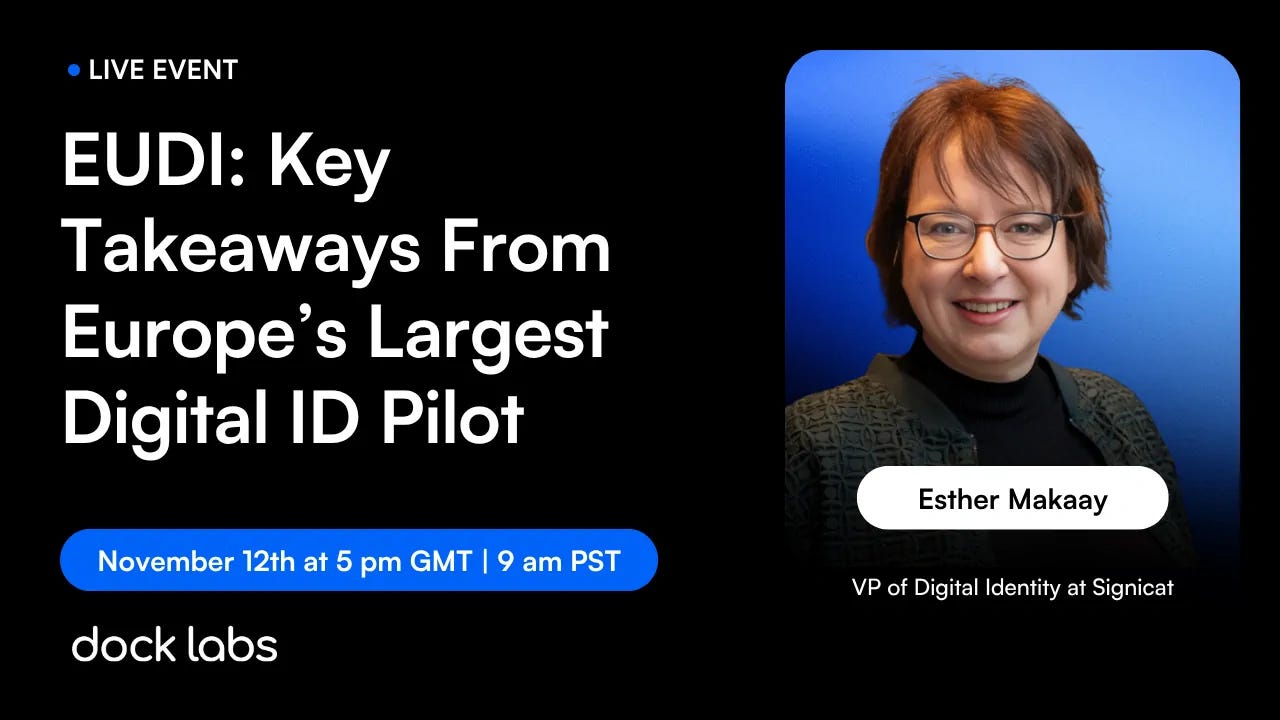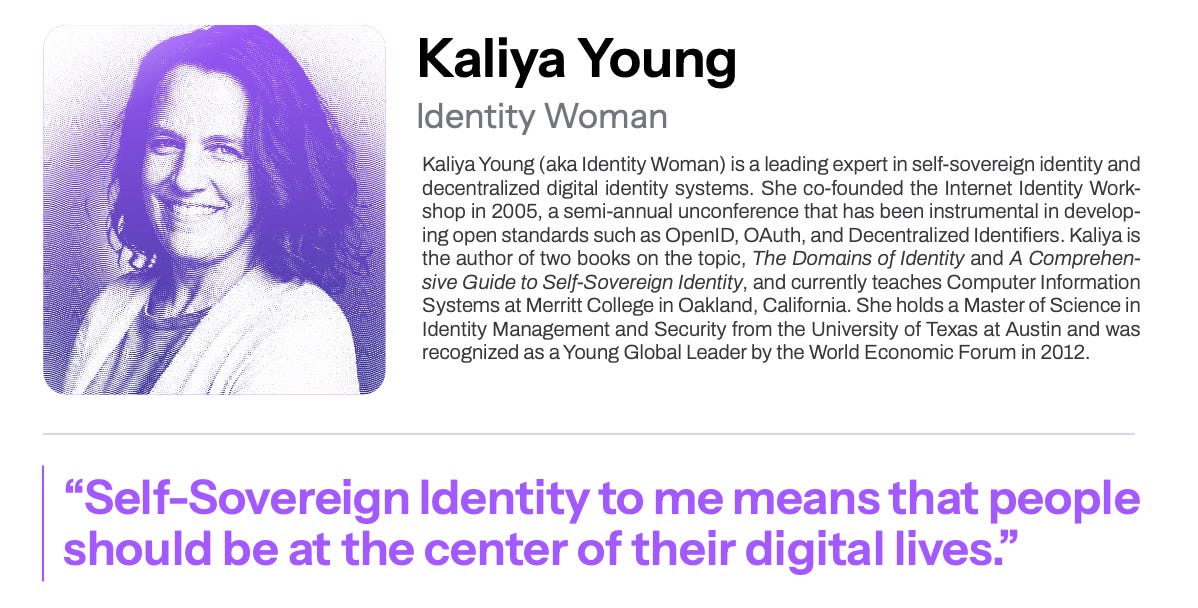Identosphere 251 Oct 27-Nov 2: Telecom and Decentralized ID • OIDF Gov Feedback • New Collaborations • Verifiable Credential Rendering Methods Final • Thoughfulness
This is the weekly Identosphere Newsletter sharing highlights from around the web covering Decentralized and Self-Sovereign Identity curated by Kaliya Young, Identity Woman.
UpComing
EUDI: Key Takeaways from Europe’s Largest Digital ID Pilot November 12, 9am PST Virtual
Redefining Age Assurance November 19 9:30 AM - 12:10 PM ET Virtual
SIDI Hub Pre-Conference Workshop @ TRUSTECH 2025 - Paris, France | Tuesday, 2 December 2025 | 14:00 – 18:00 CET
Join us at the 1EdTech Digital Credentials Summit in Philadelphia, February 18-20, 2026.
DIF Unconference Africa (an IIW Regional Event) Feb 24-26, 2026 Cape Town
[Magazine Interview] Issue 2 The Voice of the Quarter - The Future of Identity: Kaliya Young (aka Identity Woman) on Decentralization, Ethics, and the Web3 Frontier 4 Page Interview
Open Wallet’s Many Projects
Open Wallet Foundation Chart of Wallets
DIACC
DIACC and SIROS Foundation Partner to Advance Global Leadership in Digital Trust and Interoperable Credentials
Through this collaboration, DIACC and SIROS will:
Address challenges and opportunities related to international interoperability, digital trust and identity assurance policy, and trust in specific use cases.
Align efforts to enhance the secure and trusted exchange of digital credentials across sectors and jurisdictions.
Develop and showcase real-world use cases proving the effectiveness of interoperable digital trust and identity solutions.
Collaborate to advance policy alignment and technical interoperability through pilot projects and testing around use cases, including: Travel, Education, Payments, Organizational/Business credentials, Labour mobility, Professional upskilling, and Academic integration
DIACC Congratulates Quebec on Historic Adoption of National Digital Identity Legislation
We proudly congratulate the Government of Quebec and the Assemblée nationale on the adoption of Bill 82, the Act respecting national digital identity and amending other provisions.
Public Services
Digital Doorways to Public Benefits: Beneficiary Experiences with Digital Identity
Led by the Digital Benefits Network in partnership with Public Policy Lab, the Digital Doorways research project amplifies the lived experiences of beneficiaries to provide new insights into people’s experiences with digital identity processes and technology in public benefits. This report details the project’s findings, directly highlighting the voices of beneficiaries through videos and photos.
Implementing Benefits Eligibility + Enrollment Systems: State Responses to H.R. 1
This report summarizes insights from interviews with seven states on how they are adapting integrated eligibility and enrollment (IEE) systems in response to sweeping federal changes to SNAP and Medicaid under H.R. 1.
(SpruceID) Digital Wallet Certification: The Foundation for Interoperable State Identity Systems
SpruceID believes that additional legislation should be enacted to establish a formal certification program for wallets, issuers, and potentially verifiers participating in a state digital identity ecosystem. The legislation should specify that the designated regulating entity may conduct audits and certify providers directly, or delegate certification responsibilities to qualified external organizations, provided such delegation is formally approved by the appropriate higher authority.
Telecom
GSMA, Telefónica Tech, TMT ID and Dock Labs collaborate to reinvent call centre authentication
End-to-end encrypted communication: Built on the DIDComm protocol, ensuring all exchanges between the call centre and the customer’s app remain tamper-proof and confidential.
Verifiable Credentials: Enable cryptographically signed proofs of identity (e.g. account ownership).
(send to Rebekah & Peirce)
The Future of Digital Identity: A Self-Sovereign Identity Technical Implementation Guide for the Telecom Provider
Latest on DPI
2025 State of Digital Public Infrastructure Report OCTOBER 2025 A Look at Measurement and Prevalence as DPI Transitions from Experiment to Scale
Ten Years of Impact : Putting People at the Center of Digital Transformation - Annual Report 2024-25 (English)
(WEF) [Report] Advancing Digital Trade: Insights from the UAE TradeTech Regulatory Sandbox
To that end, the report presents concrete, forward-looking policy recommendations: broader adoption of the United Nations Commission on International Trade Law (UNCITRAL) Model Law on Electronic Transferable Records (MLETR), formal recognition of decentralized identity and verifiable credentials and the development of regulatory pathways for tokenized trade assets, digital bank guarantees and stablecoin-based settlement tools.
Thoughtful
Credentials not anchored in law - versus anchored
(Heather Flanagan) Can Standards Survive Trade Wars and Sovereignty Battles?
Series by Parthasarathi V
Evil Web & The Consent Trap
- How SSI and DIDs Can Fix Consent—and Fix Trust
Musings of a Trust Architect: The Exodus Protocol: Five Patterns for Creating Autonomous Infrastructures
ABSTRACT: Digital infrastructure is built on sand due to its control by centralized entities, most of which are focused on profit over service. We need Exodus Protocol services that build infrastructure without centralization, ensuring its continuation into the far future. Bitcoin offers our prime example to date. Five design patterns suggest how to create similar services for coordination, collaboraiton, and identity.
(Christopher Allen) [Video] Sad State of Decentralized Identity, and What To Do About It
Enabling a Sustainable Future through Self-Sovereign Identity
The Decentralization Utopia
Virtual Identities Department
The metaverse is rewriting the rules of who can be a K-pop star
The global market for virtual idols and streamers is projected to reach $4 billion by 2029,
AI & Identity
(Indicio ) Five reasons why AI needs decentralized identity
AI Agents and Payments
Deep Dive: What a16z’s “State of Crypto 2025” Really Says About Stablecoins and AI
A16z’s report calls out new protocol standards like “x402” (a riff on HTTP 402 Payment Required) emerging as the financial backbone for autonomous AI agents. These standards would let AI agents make micro-transactions, pay for API calls, and settle payments with no intermediaries
Productive Feedback to US Gov
OIDF offers standards roadmap for GENIUS Act
Executive Director of the OpenID Foundation, Gail Hodges, said: “This submission is part of our broader engagement with policymakers in the US and abroad on digital identity and financial innovation. The US is well placed to demonstrate how smart policies can leverage standards and conformance to deliver secure, interoperable identity infrastructure for a rapidly evolving financial sector.”
The full letter and supporting documents can be found here: Letter OIDF comment on TREAS-DO-2025-0070-0001.
OIDF submits comments on CFPB Data Rights Rule
Trust
(Cardano) We just published a new eBook on securing trust in the Internet of Things.
Architecting Trust In A Distrustful World: The Digital Leader’s Role
Centralized identity repositories have become prime targets for attackers. A shift toward decentralized identity models allows users to hold and selectively share verified credentials issued by trusted parties. This reduces the risk of mass breaches while strengthening user control over personal data. It also aligns with the growing expectation that digital identity should be as portable and user-owned as a physical wallet.
The Problem we are Solving
Verifiable Credentials, as a framework for fraud prevention, solve this problem easily.
Making Sense of it All
Gaia-X Glossary - glossary_25.05 Release
Education
Why Standards and Credentials Matter in Dual Enrollment
Credivera’s Journey: Deploying Verifiable Credentials in High-Risk Industries with DGSI/TS 115
Standards
Digital identity standards just got official! : Billions helped write them.
First Public Working Drafts: Confidence Method v1.0 and Verifiable Credential Rendering Methods v1.0
Verifiable Credential Rendering Methods v1.0
New Collaborations
Global vLEI Hackathon: How Affinidi and GLEIF Are Accelerating Privacy-Preserving Identity for the AI Era
Affinidi and GLEIF by GLEIF
GBG’s Digital ID solution is enabled through partnerships with leading industry providers including Trinsic and MATTR. To learn more about GBG’s Digital ID solution visit: https://www.gbg.com/en-us/verify-identity/digital-ids/
Daon: Daon Launches Industry-Leading Mobile Driver’s License Support, Powered by MATTR’s Verifiable Credential Infrastructure
Biometrics, verifiable credentials enable mDL support in Daon, Mattr partnership
Europe
Use swiyu, the Swiss E-ID to authenticate users with Duende and .NET Aspire
Press Release – CERT connects Vocational Education with Europe: verifiable credentials, digital identity and ESCO harmonisation
[Research] Digital citizenship: Challenges and uncertainty in applying blockchain
Colombia’s digital citizenship initiative faces limited adoption due to mistrust around data security and privacy, despite offering services like digital authentication, citizen folders, and signatures. This review suggests that blockchain-based Self-Sovereign Identity systems could rebuild trust by giving citizens greater control over their data, but only if implemented through permissioned designs with proper governance, interoperability standards, and regulatory alignment.
[Research] Identity Model for Blockchain-Based Land Registry System: A Comparison
[Research] Towards a Universal Digital Identity: A Blockchain-Based Framework for Borderless Verification





